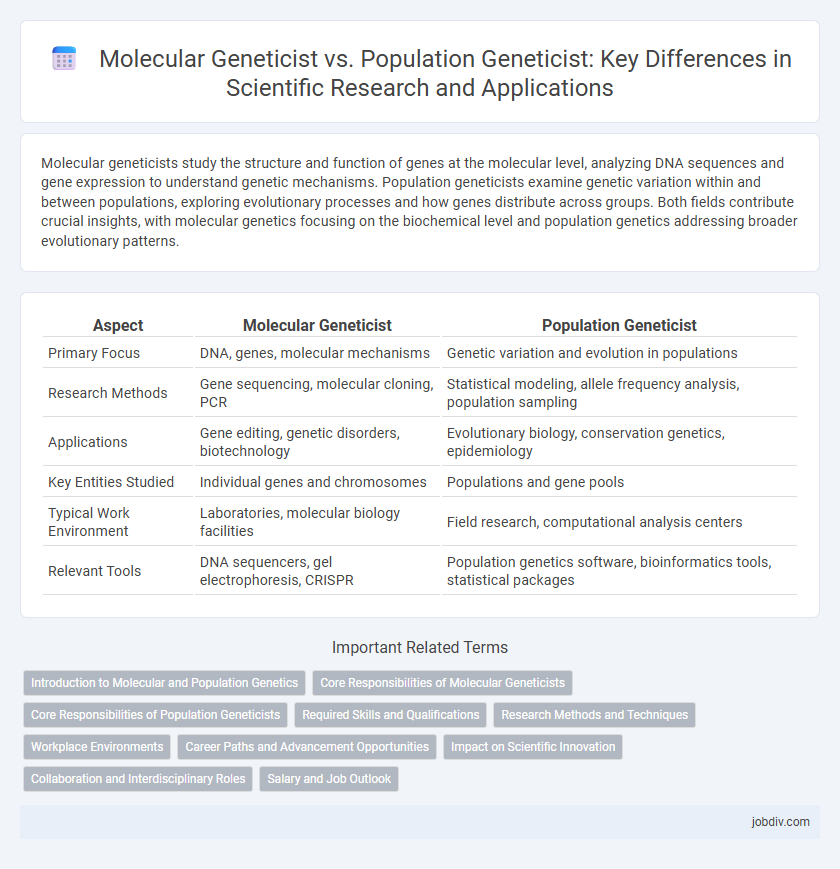Molecular geneticists study the structure and function of genes at the molecular level, analyzing DNA sequences and gene expression to understand genetic mechanisms. Population geneticists examine genetic variation within and between populations, exploring evolutionary processes and how genes distribute across groups. Both fields contribute crucial insights, with molecular genetics focusing on the biochemical level and population genetics addressing broader evolutionary patterns.
Table of Comparison
| Aspect | Molecular Geneticist | Population Geneticist |
|---|---|---|
| Primary Focus | DNA, genes, molecular mechanisms | Genetic variation and evolution in populations |
| Research Methods | Gene sequencing, molecular cloning, PCR | Statistical modeling, allele frequency analysis, population sampling |
| Applications | Gene editing, genetic disorders, biotechnology | Evolutionary biology, conservation genetics, epidemiology |
| Key Entities Studied | Individual genes and chromosomes | Populations and gene pools |
| Typical Work Environment | Laboratories, molecular biology facilities | Field research, computational analysis centers |
| Relevant Tools | DNA sequencers, gel electrophoresis, CRISPR | Population genetics software, bioinformatics tools, statistical packages |
Introduction to Molecular and Population Genetics
Molecular genetics focuses on the structure and function of genes at a molecular level, examining DNA sequences, gene expression, and genetic mutations using techniques like PCR and genome sequencing. Population genetics studies the genetic composition of populations, analyzing allele frequencies, genetic variation, and evolutionary forces such as natural selection, genetic drift, and gene flow. Both disciplines integrate to explain heredity and evolution, with molecular genetics providing detailed genetic information and population genetics interpreting these data within ecological and evolutionary contexts.
Core Responsibilities of Molecular Geneticists
Molecular geneticists primarily analyze DNA sequences, gene expressions, and molecular mechanisms to understand hereditary diseases and develop targeted therapies. They utilize techniques such as PCR, gel electrophoresis, and CRISPR gene editing to investigate genetic mutations and molecular interactions. Their core responsibilities include designing experiments to map genes, studying protein-DNA interactions, and interpreting genetic data to elucidate molecular pathways involved in various biological processes.
Core Responsibilities of Population Geneticists
Population geneticists analyze genetic variation within and between populations to understand evolutionary processes such as natural selection, genetic drift, and gene flow. They apply statistical models and molecular data to trace allele frequency changes over time and examine the genetic structure of populations. Their core responsibilities include studying population demographics, migration patterns, and the genetic basis of adaptation and speciation.
Required Skills and Qualifications
Molecular geneticists require expertise in DNA sequencing, gene editing techniques like CRISPR, and proficiency in bioinformatics tools for analyzing genetic data at the molecular level. Population geneticists must possess strong statistical skills, knowledge of evolutionary biology, and experience with software for modeling allele frequency changes in populations over time. Both roles demand advanced degrees in genetics or related fields, with molecular geneticists often focusing on laboratory techniques and population geneticists emphasizing computational and theoretical genetics.
Research Methods and Techniques
Molecular geneticists primarily utilize techniques such as DNA sequencing, PCR amplification, and CRISPR gene editing to analyze individual gene function and mutation effects at the molecular level. Population geneticists employ methods like allele frequency analysis, Hardy-Weinberg equilibrium testing, and population genomics to study genetic variation and evolutionary dynamics across populations. Both disciplines integrate bioinformatics tools to interpret genetic data, but molecular genetics focuses on cellular mechanisms while population genetics emphasizes genetic diversity and structure in groups.
Workplace Environments
Molecular geneticists primarily work in laboratory settings, utilizing advanced techniques like DNA sequencing and CRISPR to study genetic material at the molecular level, often within academic institutions, biotech companies, or research hospitals. Population geneticists typically operate in universities, government agencies, or environmental organizations, analyzing genetic variation across populations using computational models and field data to understand evolutionary patterns and biodiversity. Both disciplines may collaborate in interdisciplinary research centers where molecular insights inform population-level studies, enhancing genetic research applicable to medicine, conservation, and agriculture.
Career Paths and Advancement Opportunities
Molecular geneticists primarily focus on understanding genetic sequences and mutations at the DNA level, often working in clinical or research laboratories, with career advancement opportunities in biotechnology firms, pharmaceutical companies, and academic settings. Population geneticists study genetic variation across populations to track evolutionary changes and disease prevalence, typically employed by academic institutions, public health organizations, or government agencies, where promotions often lead to senior research or policy advisory roles. Both career paths offer specialization through advanced degrees and postdoctoral research, with leadership roles available in scientific project management and interdisciplinary collaborations.
Impact on Scientific Innovation
Molecular geneticists drive scientific innovation by unraveling the complex mechanisms of gene expression and mutation at the DNA level, enabling breakthroughs in personalized medicine and genetic engineering. Population geneticists contribute by analyzing genetic variation across populations, which informs evolutionary biology and epidemiology, guiding strategies for disease control and biodiversity conservation. Together, their complementary insights accelerate advancements in genetics research and its practical applications.
Collaboration and Interdisciplinary Roles
Molecular geneticists and population geneticists collaborate by integrating molecular techniques with population-level data to uncover genetic variation patterns and evolutionary processes. Molecular geneticists provide detailed DNA sequence information, while population geneticists analyze this data to understand gene flow, selection, and genetic drift across populations. Their interdisciplinary roles enhance insights into genetic diversity, disease susceptibility, and conservation strategies by combining laboratory methods with ecological and statistical models.
Salary and Job Outlook
Molecular geneticists typically earn a median salary of approximately $82,000 annually, driven by roles in biotechnology and medical research, while population geneticists have a median income closer to $75,000, often employed in academic and environmental sectors. The job outlook for molecular geneticists is projected to grow by 7% from 2022 to 2032, reflecting increased demand in genetic testing and personalized medicine. Population geneticist positions are expected to grow at a slower pace of 5%, influenced by research funding trends and conservation efforts.
Molecular Geneticist vs Population Geneticist Infographic

 jobdiv.com
jobdiv.com